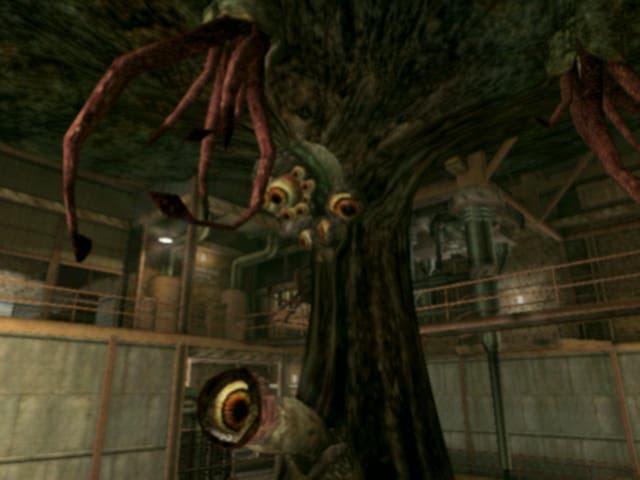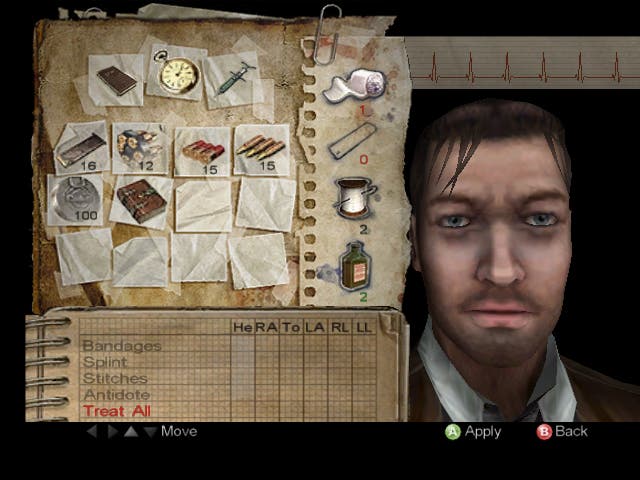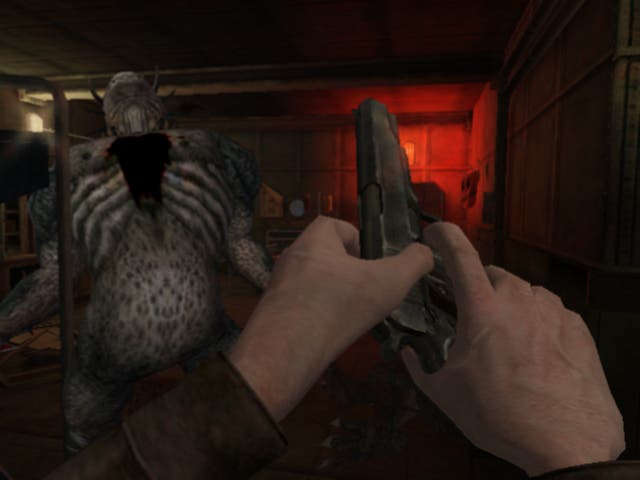Call of Cthulhu: Dark Corners of the Earth
Frankly, we're quite HP about his one.
HP Lovecraft wasn't exactly famous for his pleasant children's fairytales. Rancid putrefaction, a loose grip on sanity, and a malevolent cast of abject weirdoes were just a few of the ingredients you could expect from your average bit of HP sauce - a point certainly not lost on Brummie studio Headfirst in its long-delayed horror adventure title, Call of Cthulhu.
The Headfirst mob is certainly a team with a fair bit of narrative-laced adventure heritage, too, boasting none other than Adventuresoft veteran Mike Woodroffe at the helm. Goodness knows how many hours we've sunk into the dozens of Adventuresoft titles down the years. Just as well the lateral thought part of our brain is still intact after all the punishment...
Dark Corners of the Earth starts off so innocuously, too, via a playable prologue that gives scant warning of the horror to come. Private investigator Jack Walters is on something of a roll, managing to solve a series of crimes with barely any evidence to go on. Clearly a natural choice for an adventure game hero. But one case in particular kicks off a turn of events that triggers an inexplicable psychotic state, which results in the unfortunate private investigator winding up in a mental institution.
Rest in pieces
But after a few years inside, Walters is considered no longer a threat to himself or the public and resumes his career as a private investigator. Untroubled by his dark past, but desperate for answers, he decides to tackle a case with a Mythos connection and heads off to the small fishing port of Innsmouth. A store manager has gone missing, but with talk of an unholy cult and the locals acting suspiciously, there's more to this one than initially meets the eye.
Played out entirely from the first-person perspective (and with controls to match), the first thing that strikes you about Call of Cthulhu is how incredibly dark the whole thing is. Arriving in town after dusk, the first thing you're going to want to do is pull the blinds down, whack up the brightness a bit and peer into the gloomiest game ever. It makes Silent Hill look like Ayia Napa. Innsmouth is definitely not going to be your next holiday destination.
Once you've gotten your bearings of the small town square and associated back alleys, you're only choice is to meander around and chat to the extremely unfriendly locals in the hope of some clue as to the whereabouts of the missing local. But it soon becomes clear that not only are the natives total freaks, but they really don't welcome the presence of an outsider. And not content with just being plain rude, they all look close to death, and shamble around like zombie fishermen - which isn't that far from the truth.
Loose lips sink ships

In true adventure style, you eventually find a few loose tongues who can help, and slowly you get into the groove of this intriguing slow-burn adventure. With a few relatively simple tasks to perform, you begin to gather up objects, engage in conversation and read some journal entries that make it abundantly clear that you're in amongst a completely unhinged cult.
For the first couple of hours, the game's a relatively safe haven for the intrepid explorer, with nothing but the narrative and a few simple puzzles to crack. Sure, the atmosphere broods away quietly, and gives the impression of something big about to kick off, but nothing really prepares you for the point in the game when It All Kicks Off, and the Game Over screen flashes up more times than is strictly comfortable.
Without dropping any more potential spoilers, the game really ups the ante, heaping more terror and intrigue onto the player than possibly any comparable horror game has managed for years. For a good number of hours, it's true survival horror, forcing players to really keep their wits about them, bolting doors in the faces of aggressors and shoving bookcases up against them, jumping out of windows, fleeing across rooftops and ducking bullets fizzing through windows. There's never really been a game that terrorises the player's nerve to quite the same extent. It's unflinchingly brutal.
Armless

The main issue, from the player's perspective, is that for about the first third of the game you're completely unarmed - which is almost unprecedented for a game of this type. Normally you're fully aware of the imminent danger and come prepared, but not so in Call of Cthulhu. Set in 1922, Walters thinks he's investigating something routine, something trivial, and doesn't suspect for a moment that most of the population of the town will be trying to kill him before the night is through.
And, stripped of even a baseball bat to fight back with, the game really tests your resolve, forcing you to creep around, lurk in the shadows and leg it when you need to. But unlike every other so-called horror title, Dark Corners of the Earth really plays on the fear aspect, and specifically the psychological effect on Jack Walters of the terror he's exposed to. As in real-life, the psychological effect of knowing that a bunch of machete-wielding thugs are about to chop you into nice little steaks will send you a little bit loopy, and Call of Cthulhu deals with these fears in a very neat fashion. At first, you'll maybe feel a slight throb emanating from the pad to indicate his soaring pulse rate, but the more terror you expose him to, the more he comes close to losing it. For example, when tasked with leaping out of a window to an adjacent flat rooftop, if you pause to look down, the sense of vertigo will blur your vision, and time will seem to palpably slow down. At this point, if you tried to jump, you'd be in such a state that you'd probably not make the leap, plunging to your doom.
Likewise, if you stare too long at a dismembered corpse, or get hit by a stray bullet, the screen becomes momentarily blood-splattered and Walters starts to freak out. Your breathing starts to shallow, your vision blurs slightly and he'll start to whisper breathlessly, "What the hell am I doing here? Why did I come here?" It's proper gaming terror in a disconcertingly real sense. It never really gives you the Silent Hill or Resident Evil get-out clause of descending into too much sub-reality that reminds you that it's just demented fiction. A lot of the real scares to be had from Call of Cthulhu are down to the plausible nature of what's actually playing out.
Blammo

Of course, eventually you start to even the score, and once you manage to get your hands on some firearms you can start blasting the Innsmouth populace to kingdom come. Well, almost. In true survival horror fashion, you're given sod all ammo to play with, so every headshot counts, and that almost unbearable tension continues unabated.
One of the most endearing elements of the game, though, is that Headfirst hasn't watered down the puzzling aspect, and continually taxes your brain with a succession of satisfying brain-teasers that fit snugly into the adventure game lineage. The only real headache comes from the fact that many of them need to be solved in order to move the game on at all - leaving you potentially stuck fast while you rack your brain for the solution.
Even more pleasing is the fact that many of the problems are solved simply by reading the various scattered notes and journal entries, which not only forces the player to become immersed into the story, but means the narrative serves a purpose for once. Far too few games give the player any incentive to pay attention, and it's good to finally come across a game that does this.
Healthy option

It's also good to see a game that has taken a slightly different approach to your player's health. Rather than simply go for the tired old mechanic of making your player 'healthy' over a percentage scale, Call of Cthulhu's physical well-being is based around the various limbs, head and torso, and represents location-based damage depending on where you've been struck. If, for example, your legs are a bit mangled, you'll find yourself unable to run as fast or jump as far. Health packs are dotted around like any other game, but in them are different types of first aid which you can administer to each individual area as you see fit. Treating them quickly is cruicial, too, or else the pain from the wound will contribute to sending you over the edge. It's certainly an interesting variation on the normal system, and even tasks the player with administering first aid in a quiet moment, as each wound is treated in turn.
So far so good, then. Perhaps the main bugbear is that Headfirst hasn't really done a very good job with the voice acting, giving us the impression of a low-budget title that adopts a 'will-this-do?' approach to, arguably, one of the most important parts of the whole experience. It's hard, for example, to keep a straight face at some of the questionable accents that emanate from the goggle-eyed clan members, and even some of the supposedly normal characters are as wooden as your local village am-dram society. Okay, it's not quite that bad, but it really could have been a lot better in this department.
While we're addressing the niggles, was it really necessary for Walters to utter the same stock phrases every single time he comes across a locked door, or an item that's of no interest? Couldn't the game have simply subtitled such incidental remarks? After a few hours of hearing him make the same tired utterances, you'll not only drive yourself slightly mad, but any man, woman or pet within earshot. Parrots should be okay, mind you. Just don't be surprised if they start saying "it won't budge" 400 times a day.
Some dim

Any other complaints? If we're really pushed, we'd probably complain that the enemy sentries are a bit dim, and give up extremely easily - but we'd counter our own argument by admitting that it wouldn't really be a whole lot of fun if the patrols were any more effective than they are. For the most part, you have to admit that most of the time, the game works really well at providing just enough of a challenge without making it too frustrating to the point that you'll give up. Save points are sensibly spaced, continue points even more so, and on the whole it's one of those games you'll get a great deal of satisfaction from inching your way through.
So far, the visuals have been the great unsung hero of the game, being a well-judged mixture of the dark and rancid, with a deceptive amount of detail in a world that's not only credibly realistic, but pleasantly varied. The first-person viewpoint and complete lack of HUD has given Headfirst a real opportunity to try out something a little more immersive, and in doing do has created one of the few first-person horror experiences that works better than the numerous third-person equivalents. Even without the so-called 'dramatic' camera angles, the team has done a fine job of delivering suspense-filled world, with the occasional voyeuristic 'I'm watching you' cutaway, just to let you know that your every move is being observed by some unknown other. The little flash-forwards also go a long way to giving you the impression that something truly awful is just around the corner. The last time we felt this unnerved by a videogame was the flawed-but-magnificent Forbidden Siren, except this is a mite more forgiving than Sony's innovative effort ever was.
But hand-in-hand with the much-appreciated visual style is how well the general audio ambience works. You barely even acknowledge the brooding soundtrack growling away in the background, but it works a charm once you marry it with the throbbing heartbeat, shallow nervous breathing, frantic mutterings and angry growling of your pursuers. There's barely been a game that sounds as unsettling as this.
Your call, your duty
Whether all of this makes it worth buying is another matter. Arriving with almost zero fanfare, it's definitely one of those delightfully slow-burn adventures that will take time to appreciate. Almost to its detriment, it doesn't play its hand early on; if anything, the game takes fully three or four hours before you really start to unravel its charms, and even then it never feels like a game in a hurry. But once the pieces start falling into place, it's abundantly clear that Call of Cthulhu will be picking up a great many admirers among the fans of horror adventures - and who knows, maybe a few of you that never quite 'got' the genre too.

